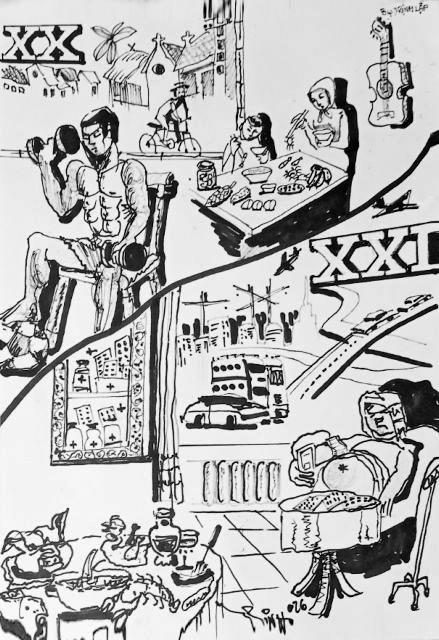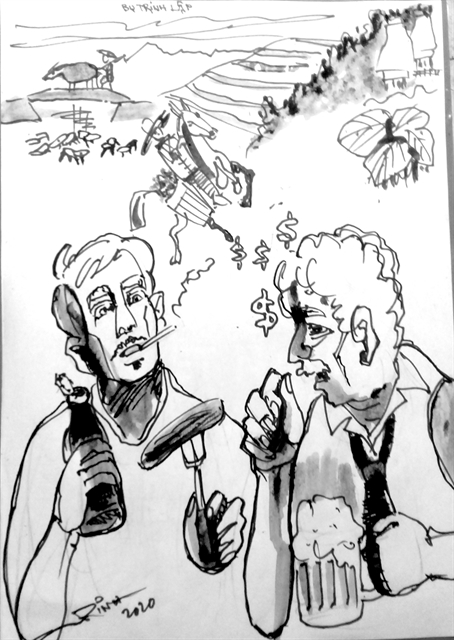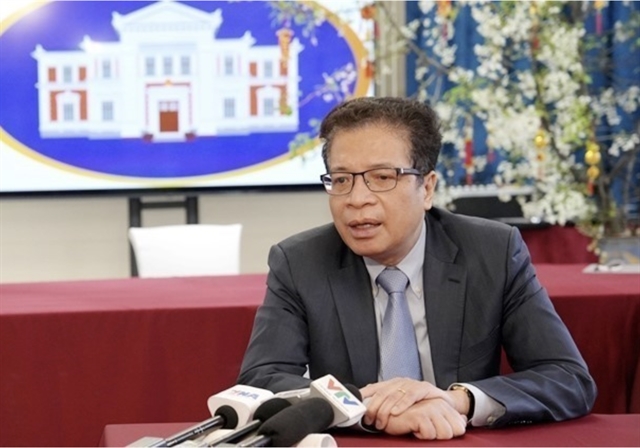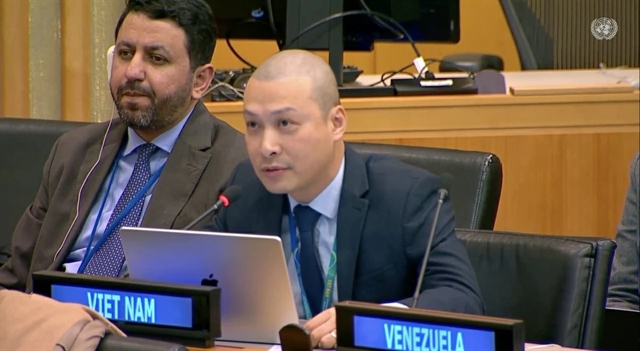 Talk Around Town
Talk Around Town


|
| Illustration by Trịnh Lập |
by Nguyễn Mỹ Hà
There’s an old pastime that’s been enjoyed by financial analysts in New York City’s bars and clubs seemingly forever: based on appearance alone, guessing how much some random guy within eyesight is worth.
In a world dominated by money and numbers day-in day-out, quick assessments about other people are simple to make and really just for fun.
Many are shocked when hearing of the game for the first time, but they soon learn (if they don’t know already) that this is the nature of the world they live and work in.
In keeping with this theme, there’s a certain parallel with a few lines of old Vietnamese poetry, whose author has been lost in time:
“Ba đồng một mớ đàn ông,
"Chị bỏ vào lồng chị xách đi chơi!”
(“I paid three đồng for a bunch of men,
"Then I put them in a bamboo cage and brought them along for a promenade!”)
The two verses have brought laughter to many generations of Vietnamese women, young and old, simply at the imaginative power to wrap up all the pain, sorrow, anger, and at times happiness brought to them by men.
Then comes more verses:
“Ba trăm một vị đàn bà,
"Đem về mà trải chiếu hoa cho ngồi!”
(“You’d rather pay three hundred đồng for a woman
"To take her home and sit her on a flowery mat!”)
While the verses speak only to wishes, they actually reflect the opposite of reality.
“Women do everything in Việt Nam,” many foreigners have observed, “and men do what’s left.”
“What’s left” isn’t that much. But it’s also said (by men mostly) that what men do are the big things, leaving simple daily chores to women.
If you take a man out of his familiar environs, though, outside of his comfort zone, what does his worth become?
Every year, hundreds of thousands of people - men and women and sometimes their children - are forced out of or choose to leave their comfort zone to start new lives in a distant land.
They leave behind familiar faces, routines, friends, and food, throwing themselves into a new environment with different weather, languages, customs, food, and, of course, expectations.
If a white man from a developed country goes to live in a developing country, it’s accepted that he’s daring, adventurous, and capable.
But if a man from a developing country decided to head elsewhere, chances are he’d need to learn a new language, live in far-from-ideal conditions, try and find new food to his liking, and hopefully get paid enough so he has the money for the airfare home if his whole plan ends in tatters.
The media likes to showcase success stories of people who left their homeland for economic reasons and ended up with an impressive mansion in the best part of town.
Little or almost no attention is paid to less-successful moves that broke families apart and shattered childhoods.
Last year a tragedy took place in the UK, when a lorry smuggling Vietnamese workers turned into a mass grave. Thirty-nine young people were suffocated in the freezing containers near the end of a risky quest for money and a better life. They were well nourished, had the money to pay the smugglers, and could have worked other jobs in Việt Nam to make a modest living.
But the promise of quick money, compared to Việt Nam, proved irresistible, with ideas of a few years in the UK followed by a wonderful homecoming and money in the pocket.
There was indeed a homecoming for the 39, but not the one they were expecting.
While the majority of Vietnamese felt sorry for the ill-fated migrants and their families, including yours truly, others criticised the choice they made.
“It’s just not acceptable, this mentality, popular among Vietnamese, about winning the lottery or stumbling upon a gold mine and not having to earn their way,” or a similar sentiment, was a common refrain.
“Blame it on the media,” said one Vietnamese man in his late 40s, who has spent half of his life in Europe and is a social network friend of mine.
“They paint rosy pictures of people heading off to European, US, or Canadian shores, where they find success with little effort. It has to stop!”
To be honest, in an ever-shrinking world, it’s tempting to take a chance and pursue your dreams and try new lands, building a new life when you’re young and healthy and feel like you could overcome any obstacle you encounter, picking up some social network envy while living colourful and eventful days.
On a recent trip to Việt Nam’s north I met some young, hardworking people in Lào Cai Province. They tend their farm in a remote valley, virtually untouched even by telephone networks let alone the fearful world of COVID-19.
They plant their rice, grow their tea, raise their cattle, pigs, and poultry, and depend mostly on their health to put food on the table. Their children go to public boarding schools and come home for the weekend. Their interaction with the outside world is limited to local tour operators and government programme officers.
They can survive on their own, spending time on the farm and the plantation, with rice and vegetables in their garden and chickens and ducks in their pen. They may even make their own maize alcohol somewhere nearby.
They are at peace. But if you took them away from their land, to the big city, they simply could not function as they normally would.
But leave them where they are, and they are truly the King and Queen of their land, not only far from pandemics but also able to produce the food that sustains themselves and, more importantly, others they will never meet. That is their true value, not some monetary figure assigned them by people in a bar. VNS




